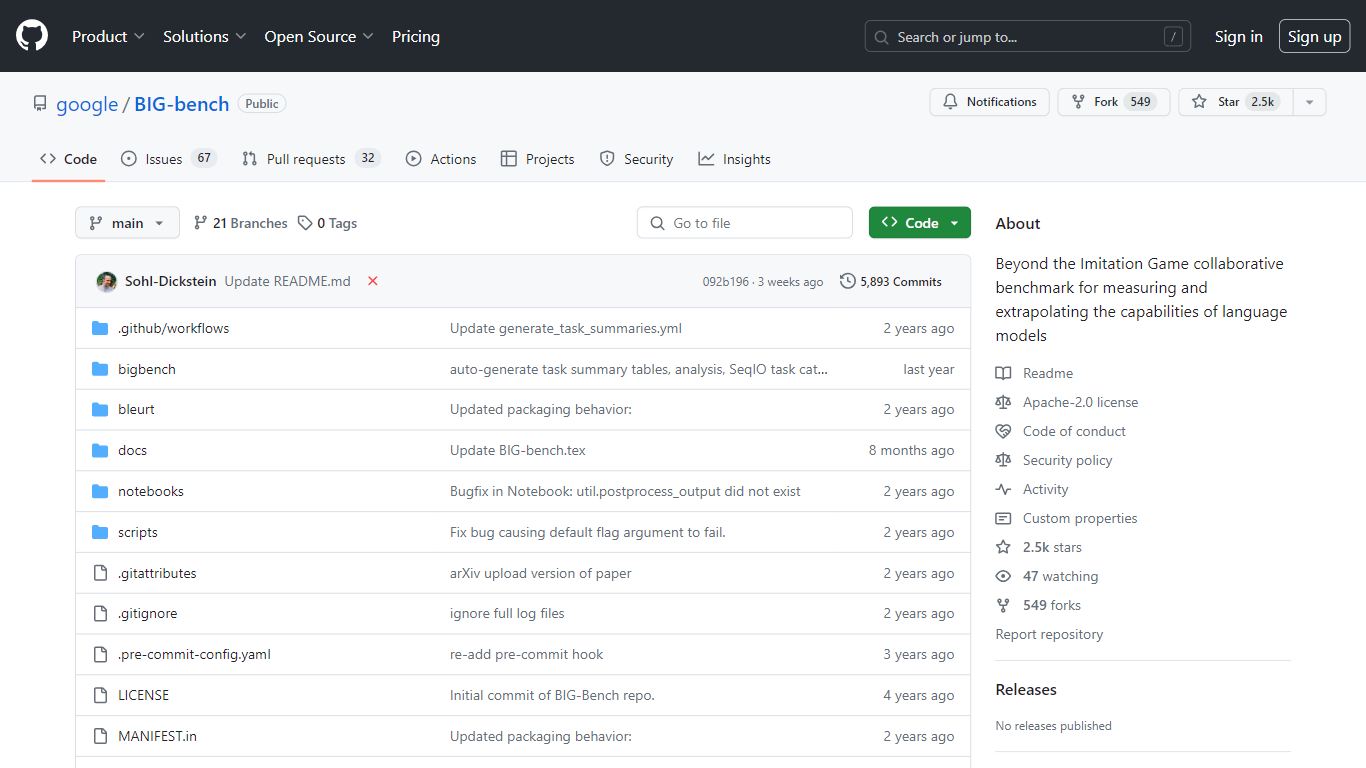BIG-bench vs GPT-4
In the clash of BIG-bench vs GPT-4, which AI Large Language Model (LLM) tool emerges victorious? We assess reviews, pricing, alternatives, features, upvotes, and more.
When we put BIG-bench and GPT-4 head to head, which one emerges as the victor?
Let's take a closer look at BIG-bench and GPT-4, both of which are AI-driven large language model (llm) tools, and see what sets them apart. The upvote count favors GPT-4, making it the clear winner. GPT-4 has received 7 upvotes from aitools.fyi users, while BIG-bench has received 6 upvotes.
You don't agree with the result? Cast your vote to help us decide!
BIG-bench

What is BIG-bench?
The Google BIG-bench project, available on GitHub, provides a pioneering benchmark system named Beyond the Imitation Game (BIG-bench), dedicated to assessing and understanding the current and potential future capabilities of language models. BIG-bench is an open collaborative initiative that includes over 200 diverse tasks catering to various aspects of language understanding and cognitive abilities.
The tasks are organized and can be explored by keyword or task name. A scientific preprint discussing the benchmark and its evaluation on prominent language models is publicly accessible for those interested. The benchmark serves as a vital resource for researchers and developers aiming to gauge the performance of language models and extrapolate their development trajectory. For further details on the benchmark, including instructions on task creation, model evaluation, and FAQs, one can refer to the project's extensive documentation available on the GitHub repository.
GPT-4

What is GPT-4?
GPT-4 is the latest milestone in OpenAI’s effort in scaling up deep learning.
GPT-4 is a large multimodal model (accepting image and text inputs, emitting text outputs) that, while less capable than humans in many real-world scenarios, exhibits human-level performance on various professional and academic benchmarks. For example, it passes a simulated bar exam with a score around the top 10% of test takers; in contrast, GPT-3.5’s score was around the bottom 10%. We’ve spent 6 months iteratively aligning GPT-4 using lessons from our adversarial testing program as well as ChatGPT, resulting in our best-ever results (though far from perfect) on factuality, steerability, and refusing to go outside of guardrails.
GPT-4 is more creative and collaborative than ever before. It can generate, edit, and iterate with users on creative and technical writing tasks, such as composing songs, writing screenplays, or learning a user’s writing style.
BIG-bench Upvotes
GPT-4 Upvotes
BIG-bench Top Features
Collaborative Benchmarking: A wide range of tasks designed to challenge and measure language models.
Extensive Task Collection: More than 200 tasks available to comprehensively test various aspects of language models.
BIG-bench Lite Leaderboard: A trimmed-down version of the benchmark offering a canonical measure of model performance with reduced evaluation costs.
Open Source Contribution: Facilitates community contributions and improvements to the benchmark suite.
Comprehensive Documentation: Detailed guidance for task creation, model evaluation, and benchmark participation.
GPT-4 Top Features
No top features listedBIG-bench Category
- Large Language Model (LLM)
GPT-4 Category
- Large Language Model (LLM)
BIG-bench Pricing Type
- Freemium
GPT-4 Pricing Type
- Freemium
